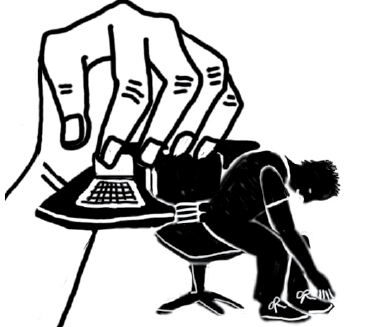There’s a strange feeling that comes with having something stolen. Two years ago, my phone was stolen as I was getting on a train home for reading week. Because I had a new contract and needed a phone, I had to pay $500 out of pocket to replace the stolen phone. On one hand, I was thankful; at least it was my phone and not my laptop. On the other, I felt betrayed and hurt. Who would do that and why?
Theft on campus has gotten more attention than usual lately. It seems like two clear forces are at work. On the one hand, there seems to be a breakdown in traditional norms of trusting fellow students to watch your belongings. On the other hand, it’s becoming clear that in many cases, it isn’t merely students stealing from students, but in fact organized thieves who are strategically targeting us in and around our campus.
From the first day I stepped on campus, when you left your belongings in a given student space it was respected that it was in use and that materials weren’t to be touched. Library study space has always been in short supply and the unspoken word of conduct was to respect the that reservation in such a way. There has also been the understanding that the people sitting nearby would watch it and prevent others from either stealing your things or your spot.
This year, this no longer seems to be the case. Several individuals have lamented on social media networks of their laptops being stolen from the library or any one of the numerous cafes around campus. Worse yet are incidences of students being robbed while they’re fully present.
Lorna Cantalare, a U2 international development student, recently shared with me how she fell victim to a strategic pair of thieves. She had been at a café near campus for four to five hours. She says she was also extremely vigilant about guarding her belongings. If she left her table to get a drink, as she did several times, she brought everything but a book with her.
Despite the precautions she took, she was robbed. While she was seated and reading, a young man tapped her shoulder from behind and asked an innocuous question. She answered and turned back to continue reading. It wasn’t until several minutes later that she turned back to her bag to find her laptop was gone. All it took was five seconds, she said, and she was left with what she described as a “disgusting feeling.”
“Everywhere I go, I take my laptop, my phone and my wallet,” she explained. It didn’t matter that the café was busy with students, or even that she was sitting close to the register where employees had a clear view of the exchange. No one saw it happen, and no one stopped the man from leaving with her computer. Only video surveillance of the exchange would confirm her suspicions. A man in his early to mid 40s had snatched her laptop from her bag when she had been distracted by the first man.
Although she filed a police report, Cantalare found the police largely unresponsive and insensitive. Ironically, an officer even told her that she could file her stolen laptop report online from home, despite the fact that her computer had been stolen. The café only turned over surveillance footage after the report had been filed, and she had since been pushing the police to collect the tape that clearly shows the man’s face. She’s since taken it upon herself to circulate the photo to local coffee shops around campus. Employees of at least three locations just off campus have recognized the man. Online postings of the image generated a lot of responses, she also explained, with many students reaching out to her to share their similar experiences. The issue is no longer carelessness, she concludes, but students targeted by organized thieves ready to capitalize on distraction or complacency in campus libraries.
She told me that we all recuperate eventually, but in the short term, one’s mind is completely preoccupied with having been a theft victim. The way you look at people changes. Everything she explained hit home for me. I myself had become incredibly critical of any strangers that bumped into me in a crowded public place. Were they trying to grab my phone? Was there a hand reaching for my purse? Perhaps this teaches a lesson to be critical of those we meet, but I can’t help but think that it makes students more skittish, while further detracting from the quality of our studies. Who wants to feel the need to be constantly vigilant? We only have so much attention to give to things when we’re already consumed with studying, classes and clubs.









